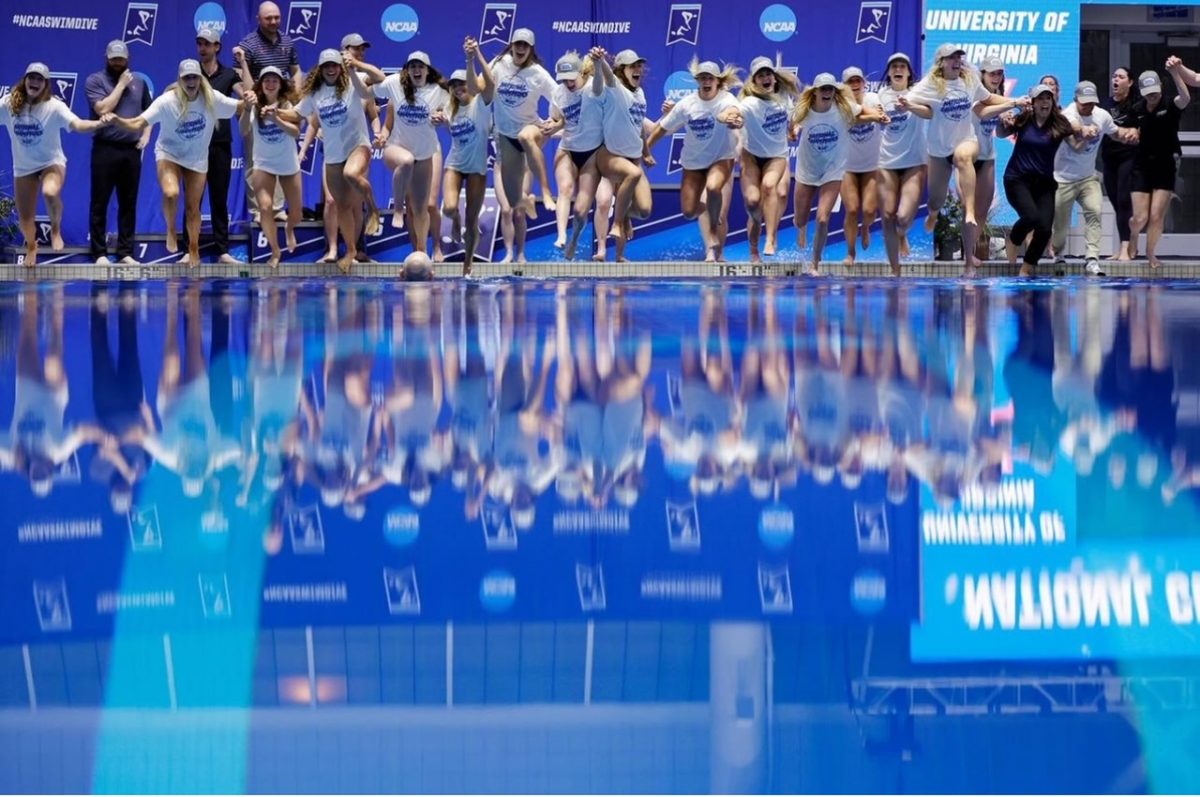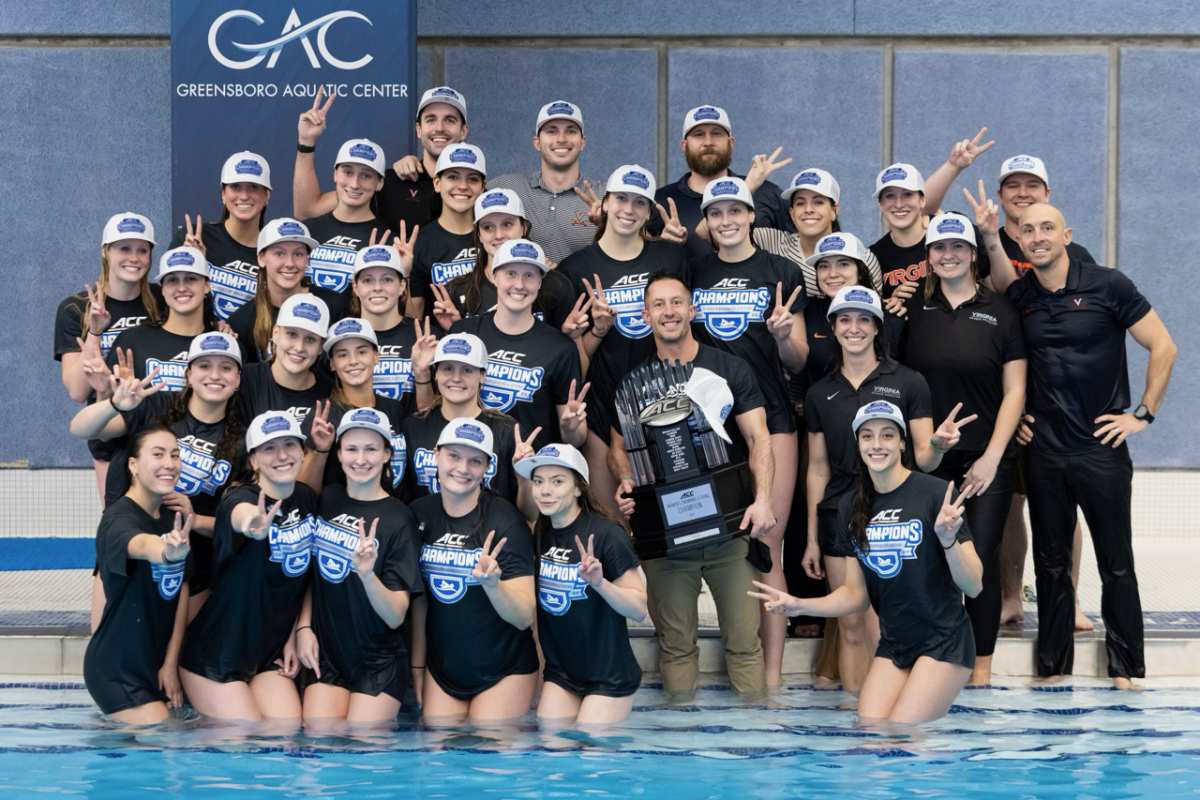The University of Virginia women’s swim and dive team brought home the NCAA Division 1 championship title for the fourth year in a row. UVA is now part of a small list of Division 1 women’s swim teams that have won more than three consecutive NCAA championships, joining the University of Texas and Stanford University.
There were ups and downs (mostly ups) for the Cavaliers last week. They won the first event of the meet, but touched fourth in the 800-yard freestyle relay. This meant the Hoos stood in second place at the end of day one—but that didn’t last for long. Gretchen Walsh took three individual NCAA titles, and also considerably lowered the NCAA record in each of the swims. Alex Walsh also took gold in all three of her individual events, and Jasmine Nocentini touched first in the 100-yard breaststroke. After the fourth-place finish on the first day, UVA won every relay during the meet, ending with a gold in the 400-yard freestyle relay on night four. The team ended the meet in first place, nearly 87 points ahead of second-place finisher Texas.
Before 2020, UVA women’s swimming was not nearly the powerhouse we know today. In 2019, the Cavs finished the NCAA championship meet in sixth place (268.5 points behind the first-place team), with no records. Now, UVA owns 11 of 19 possible records in NCAA D1 women’s swimming. But the team didn’t stumble across these accolades solely by luck—the Hoos stepped up their game during practice and increased their efficiency as they swam to the top of the rankings.
During her first year swimming at UVA, Cavan Gormsen was immersed in a new training program, which she says is very different from what she did in high school. One difference is the use of a statistical analysis program the team does in partnership with a professor at the university. This more scientific use of numbers in swim training helps swimmers learn how to improve their technique and get the most out of their stroke. “There’s been a big difference,” she says. “I’m going fast times, but in a more efficient way where I’m conserving more energy.”
Professor Ken Ono began working with UVA’s swim team in 2019. Although a statistics prof helping out a Division 1 swim coach might sound like a joke set up, Ono’s work on the pool deck provides helpful feedback and analysis that swimmers and coaches can look at together.
“What I do is not big data. I’m not doing machine learning, training for the average. I’m literally constructing a digital twin of everyone I test,” Ono says.
This creation of a “digital twin” is done by attaching an accelerometer and force sensor to the swimmer and using an underwater camera to capture data. This data includes information like moments of deceleration, and the force sensor measures the amount of force generated by a swimmer’s movements. “I look at the video trying to figure out what is causing [deceleration],” Ono says. “I write reports, I pass that along to the coaches, and the coaches keep an eye on that and help the athletes remove some of those sources.”
One swimmer who substantially improved over the past few years is Kate Douglass, who, since joining the team in 2019, has become an Olympic medalist, world champion, and NCAA and American record holder.
Douglass was a statistics major in college, and is continuing this academic pursuit in graduate school while training with the team. She doesn’t typically do any statistical analysis like this in the classroom—she is more interested in number theory—and says she is working on an independent study with Ono, but unrelated to swimming.
Even if it isn’t her academic interest, Douglass has benefited from Ono’s analysis methods. “It definitely was super helpful to kind of pinpoint exact areas in a race or a stroke that [wasn’t] efficient, and figure out how to make it more efficient so that you decelerate less or get more out of each stroke.”
Douglass started her career at UVA as primarily a sprinter, but Ono says he quickly recognized that she would be a strong breaststroker. “I remember telling [Coach] Todd [DeSorbo], ‘I know she’s gonna score a ton of points for you in relays and sprint, but she’s really the most gifted’—and I still maintain that—‘in 200 breaststroke,’” he says.
Douglass now holds both the American and NCAA records in the 200 breaststroke, and has medaled in the event at multiple world championship meets. Some consider her a favorite to make the Olympic team in this event.
“Making everything that I do more efficient is gonna make me better. And I’ve specifically seen that in my breaststroke this year especially. We’ve kind of just been working on making my stroke and my kick as efficient as possible to be able to get more out of each stroke,” Douglass says. “And I’ve already seen, I feel like, a huge improvement in my 200 breaststroke this year because of that work.”
DeSorbo speaks to the impact of Ono’s use of statistical analysis to help DeSorbo and the swimmers; it’s effective and has contributed to the team’s ascension to the top of the NCAA, but it isn’t everything—maybe 10 or 20 percent of the cause. “I think it has contributed to the success of the program, to certain individuals within the program,” he says. “But I think that without a lot of the other 80 percent of what goes on in our program, none of it would happen.”

